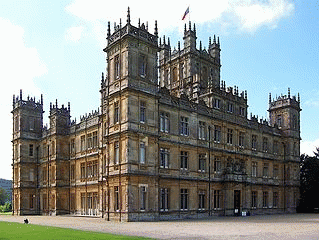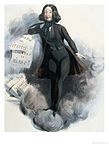(Article changed on January 4, 2014 at 12:05)
(Article changed on January 3, 2014 at 19:00)

Highclere Castle, set for Downton Abbey
(Image by (From Wikimedia) JB + UK_Planet, Author: JB + UK_Planet) Details Source DMCA
As a student in
Downton Abbey, the
lavish ITV/PBS serial melodrama that has
In the first season, Fellowes at least made mention of the
class breakdown: the youngest daughter, "Lady Sybil", ran off with the
chauffeur, the new heir turned out to be a bourgeois lawyer, and one of the
maids turned in her mop for a typewriter. World War I, as we all know from Downton's predecessor , Upstairs, Downstairs, famously shed
some decorum and class rigidity, as a middle class rose up from the war
ashes. Fellowes very nearly delivered a
better and more just world. But by season two (we are four seasons in, and a
fifth one is about to start filming) Fellowes had already abandoned any
pretense of social commentary and succumbed to the public's yen for opulence
and its fantasies of ringing for servants. In the second season, the estate went bankrupt
and was to have been sold off in parcels until a ridiculous plot twist saved it
for the next generation of entitled aristocrats. As heiress Mary says, as she
attempts to milk her American grandmother of her fortune, "One day I will be
Countess of Grantham, and the Countess of Grantham lives at Downton Abbey".
Sure, Mary, you are "entitled" to live in
Absent historical perspective, Downton devolves into a full-out soap opera I rank with my mother's fav, All My Children. They can be addictive, as anybody sick in bed for a month knows; the parade of deaths and divorces, affairs, murders and bastard children can reel you in, even as the plot slogs along at a turtle's pace. Fellowes delivers all of that, skipping months and even years between installments to speed it along. Maggie Smith, as the Dowager Countess, spits out hilarious barbs, but she cannot save the series from shallow writing. Shirley MacLaine shows up as the American grandma, reminding them all that the future won't look like the past; but regrettably Fellowes never allows the future to show up. Only the servants are drawn with any human depth and complexity; the "upstairs' elites are as cardboard as comic strip characters.
As one by one the leading actors ditched the show for more
lucrative
And so we worker-bees dream on. We savor with voyeuristic pleasure the fifty thousand dollar gowns that parade through the show like the Tolstoy-era runway dresses featured in the commercials of the show's sponsor, Ralph Lauren. The royals are swell, greed is good, and though we will only suffer from all of it, we can inhale its charms via vicarious imaginings and cheer the passing carriages from the curb. Early on in the serial we are meant to feel sorry for Mary, the rich girl barred from working for a living or engaging in pre-marital sex. In that first year there was barely a suitor in sight, and the frustrated duchess-in-waiting allowed herself to be seduced by a visiting Turk. But by season four, Fellowes had dreamed up three young and handsome suitors, eligible Lords all, each wealthier than the next, begging for her hand. So much for commentary. The former chauffeur and radical Irish socialist, Tom Branson, by now a widower, sheds his values and moves into the manor. Fellowes tells us how uncomfortable he is in his new digs, but the character who once spoke for "our lot" is no more; he has been replaced by a tuxedo-ed mannequin.
The "Big Club" in the US, the one none of us peons are in, according to George Carlin, is a much smaller club in the UK; one dominated in the early 20th century by the heirs to royal land gifts. The scores of dukes, earls, viscounts and barons may have had a place when their farms fed the nation and the lords raised armies and led them into battle to thwart a Spanish invasion. But the peers of the Downton WWI period offered no such services. Most did look after their tenants and the rural communities around them, and several were begrudgingly shamed into allowing their castles to be turned into hospitals during the war. For many the shooting parties and costume balls came to an abrupt end in the 1920's. But not for Downton Abbey.
In our time, many of those castles have been bought by
modern-day robber barons; corporate heads who, like Russian oligarchs, pay
themselves fortunes. A new generation of "aristocrats" has supplanted the old,
a class constructed of
The post-war Socialist era in
Mercifully, the Downton Abbey series will end after its fifth season, which will close the book just prior to the start of WW II (no point in allowing that moment of socialism to dull the glitter). But hold on - Fellowes is currently writing an American version, based on life at the Vanderbilt mansions. So we can all cheer the rule of the arrogant rich for years to come. That will be my cue to unplug the television and chuck it into the garbage.
As for the popularity of Downton - with 700 television channels spewing utter garbage, what else? At least for the moment it provides an impetus to debate the current American class system, one where any gambler or criminal with a fortune can buy politicians and write laws. But I confess that Downton Abbey gives me creepy shivers. And I doubt I am alone in that.





